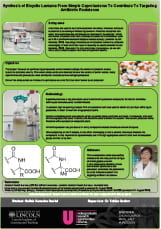by Saffah Huseeba Danial

When was the last time you were prescribed a course of antibiotics? Did you complete it as directed, without missing a dose? Did you know that antibiotic resistance is one of the greatest threats we face today (Antibiotic Guardian, 2014)?
Antibiotics are essential in treating many bacterial infections in both humans and animals. They can also be used to prevent infection in the case of operations or may be recommended for those vulnerable to the harmful effects of infection, for example, people with weakened immune systems due to chemotherapy or HIV (National Health Services, 2019a).
Unfortunately, antibiotics have been overused, leading to strains of bacteria resistant to many antibiotics, known as ‘superbugs’ (National Health Services, 2019b). Missing doses or not completing a course of antibiotics correctly may also result in antibiotic resistance. Superbugs are increasingly difficult to treat, sometimes resulting in disabilities and even death.
Antibiotic resistance is an epidemic challenge, requiring extensive research for providing treatments for concerning bacterial conditions, such as antibiotic-resistant gonorrhoea (a sexually transmitted infection), clostridium difficile (a bowel infecting bacteria), methicillin-resistant Staphylococcus aureus (MRSA) and multi-drug-resistant tuberculosis.
My project focused on synthesising molecules to contribute to research in targeting antibiotic resistance. My work was carried out in a laboratory setting at the University of Lincoln, under the direct supervision of Dr Tobias Gruber. I learnt a range of research skills, including planning and executing the synthesis of organic compounds, interpreting NMR spectra, working with solvents and syringes and running a chromatography column containing silicon dioxide.
I produced some interesting compounds in the lab, and I am proud to have been the first ever person to synthesise a particular compound (image)!
Conversely, I also faced some challenges during my project, such as having to work with new equipment, e.g. a rotary evaporator, which took a while to learn. Separately, one of the compounds formed still contained starting material, which resulted in me having to repeat a procedure, for which just the initial step took over 24 hours. Overall, I learnt that when carrying out lab work, there is always the possibility of unexpected setbacks and human error. However, it is important to stay positive and work around the barriers and learn from every situation.
My UROS project enabled me to work collaboratively with my supervisor, which was a terrific opportunity, allowing me to discuss theory and procedures throughout the seven weeks. The experience was invaluable in preparing me for my future, as I gained several important skills, including academic writing, self-organisation and safe-working in the lab environment. These qualities are helpful for me as a current Pharmacy student and also for my future profession, as it is the responsibility of a Pharmacist to manage medicines safely and effectively.
I would like to thank Dr Gruber for giving me this extraordinary opportunity and also to Christian Weck for his help and support with this project.
Reference List
Antibiotic Guardian (2014) Become an antibiotic guardian. Unknown: Public Health England. Available from https://antibioticguardian.com/ [accessed 31 August 2019].
National Health Services (2019b) Antibiotic resistance. London: National Health Services. Available from https://www.nhs.uk/conditions/antibiotics/antibiotic-antimicrobial-resistance/# [accessed 31 August 2019].
National Health Services (2019a) Uses. London: National Health Services. Available from https://www.nhs.uk/conditions/antibiotics/uses/ [accessed 31 August 2019].
*To view Saffah’s project poster, please click on the thumbnail below:
